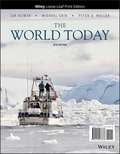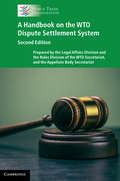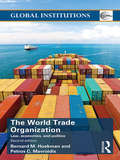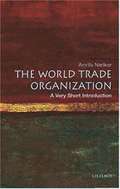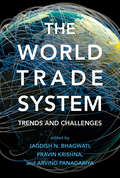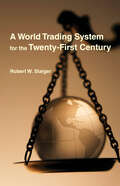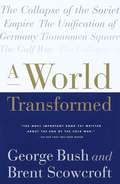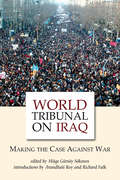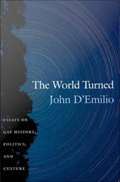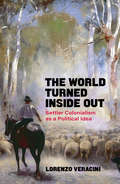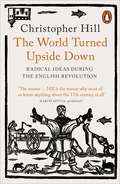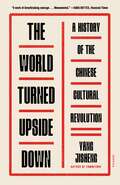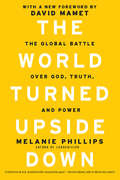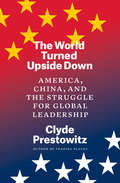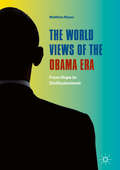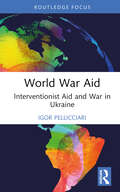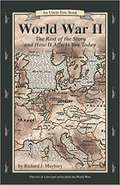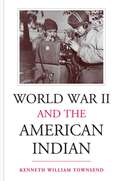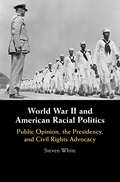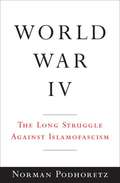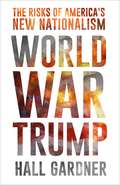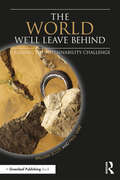- Table View
- List View
The World Today: Concepts and Regions in Geography
by Jan Nijman Peter O. Muller Michael ShinIn the 8th edition of this market-leading title, The World Today continues to break new ground in the interpretation and teaching of world regional geography. The text explains the contemporary world’s geographic realms in terms of their natural environments and human dimensions in a clear and concise fashion. The authors look at the ways people have organized their living space, adapted to changing social as well as environmental circumstances, and continue to confront forces largely beyond their control ranging from globalization to climate change. <p> This book offers an approach to Geography that meshes theoretical concepts with regional realities. The evolving regional content of the chapters in the 8th edition of The World Today reflects the dynamic nature of the world’s geography; the changing and growing number of concepts mirror the progress of the discipline; and the ongoing introduction of new digital features reflects the instructional possibilities of new technologies.
World Trade Organization
byDiploma Thesis from the year 2006 in the subject Law - European and International Law, Intellectual Properties, grade: 1,00, University of Salzburg (Volkerrecht), 97 entries in the bibliography, language: English, abstract: Die vorliegende Diplomarbeit behandelt das Problem der Regelung von Wettbewerbsfragen im Volkerrecht im allgemeinen und in der WTO im besonderen. In Kapitel 1 werden die wirtschaftlichen Hintergrunde und unterschiedlichen Motive fur staatliche wettbewerbsrechtliche Regelungen dargestellt. Kapitel 2 stellt verschiedene Tatbestande, die im Wettbewerbsrecht als regelungsbedurftig angesehen werden, vor (z. B. Kartelle, Missbrauch der marktbeherrschenden Stellung, etc. ). Kapitel 3 beschreibt nationale Regelungsansatze des Wettbewerbsrechtes einschlielich bilateraler Kooperationsabkommen, die zur Durchsetzung nationaler Regelungen erforderlich sind. Besonderes Augenmerk wird auch auf die unterschiedlichen Rechtskulturen gelegt, die die nationalen Regelungen beeinflussen. Kapitel 4 stellt die bisherigen Regelungsansatze auf internationaler Ebene dar, wobei die auf regionaler Ebene verbindliches Recht darstellen, die auf universeller Ebene allerdings im Bereich des soft laws bleiben. Kapitel 5 und 6 stellen die Kernkapitel der Arbeit dar und befassen sich mit Wettbewerbsrecht im Rahmen der WTO. In Kapitel 5 werden bestehende wettbewernsrelevante Regelungen in der WTO dargestellt. Zunachst wird beschrieben, welche staatlichen Manahmen, die von der WTO Rechtsordnung erfasst sind, den Wettbewerb beeinflussen. In einem weiteren Schritt wird analysiert, welche WTO Regelungen Staaten verpflichten konnten, privates wettbewerbswidriges Handeln zu regulieren. Da die Regelungen der WTO grundsatzlich Verpflichtungen fur Staaten enthalten, wettbewerbsrelevantes Verhalten aber von Unternehmen gesetzt werden, ist es notwendig, einen Zusammenhang zwischen dem Verhalten von Privaten und den staatlichen Verpflichtungen aus dem WTO Recht darzustellen. In Kapitel 6 wird
World Trade Organization: Law, Economics, and Politics (Global Institutions)
by Bernard M. Hoekman Petros C. MavroidisThe World Trade Organization (WTO) is one of the most important international organizations in existence today. It contains a set of disciplines that affect the ability of governments to impose trade restrictions, and has helped to support the steady expansion of international trade since the 1950s. The WTO has been the focus of vociferous protests by anti-globalization activists and has experienced great difficulties in agreeing to new trade rules since its establishment. At the same time it has become the premier global forum for the settlement of trade disputes and has proven to provide a robust framework for international cooperation in the trade area. This book separates the facts from the propaganda and provides an accessible overview of the WTO’s history, structure and policies as well as a discussion of the future of the organization. It also confronts the criticisms of the WTO and assesses their validity. New to the second edition: discussion of legislative amendments to the WTO Agreement, in particular Aid for Trade, the Agreement on Trade Facilitation and the Bali Package evaluation of case law developments and major disputes since 2007, including analysis of the WTO and the financial crisis – in particular the trade policy responses of WTO Members and institutional response reflection on recent shifts to mega-regional agreements (TPP, TISA, TTIP) and their implications what next post Bali? Fully updated throughout, this book continues to be essential reading for students of international trade, international political economy, commercial law and international organizations as well as activists and others interested in a balanced account of a key global institution.
The World Trade Organization: A Very Short Introduction
by Amrita Narlikar"This book provides a timely exploration of what the WTO is, what it does, and the complicated politics involved in its negotiations and rulings. Confronting the controversy surrounding the WTO head-on, the author highlights issues of power, marginalization, and development, and raises the important question of whether it actually deserves the reputation it has come to acquire."--BOOK JACKET.
World Trade Politics: Power, Principles and Leadership
by David A. DeeseThis book develops a new theoretical approach to understanding the role of leadership in trade negotiations. By examining in detail the key role of leadership in the GATT/WTO system, it offers new insights into trade bargaining from the inception of the GATT through to the current WTO Doha Round. David A. Deese makes use of an impressive range and amount of primary material on the GATT/WTO system from a variety of official sources. World Trade Politics will be recommended reading for upper level undergraduate as well as postgraduate and research students, and will be essential reading for scholars of the global trade system.
The World Trade System: Trends and Challenges (The\mit Press Ser. #1142)
by Jagdish Bhagwati Pravin Krishna Arvind PanagariyaLeading trade esperts examine the world trading system today, from the multilateralism of the WTO to explosive bilateralism and the mega-regionals TPP and TTIP.When the General Agreement on Tariffs and Trade (GATT) metamorphosed into the World Trade Organization (WTO) in 1994, it seemed that the third pillar of the international economic superstructure was finally in place. And yet with the failure of member countries to close the Doha Round of trade negotiations and the emergence of bilateral and plurilateral preferential trade arrangements (PTAs) such as the Trans-Pacific Partnership (TPP), the future of the multilateral WTO seems uncertain. In this volume, leading economists examine issues in trade policy that have arisen during this shift. The contributors discuss such topics as the effect of trade on poverty and inequality, PTAs and litigation between trading partners, the WTO Trade Facilitation Agreement, and the relationship of food security and trade liberalization. They also offer regional perspectives on the TPP and trans-Atlantic free trade. ContributorsRahel Aichele, Jagdish Bhagwati, Steve Charnovitz, Gabriel Felbermayr Dimitar Gueorguiev, Bernard Hoekman, Jonas Kasteng, Pravin Krishna, Mary Lovely, Petros Mavroidis, Devashish Mitra, Arvind Panagariya, Tom Prusa, Andre Sapir, Stefan Tangermann
The World Trade System: Trends and Challenges
by Arvind Panagariya Jagdish N. Bhagwati Pravin KrishnaWhen the General Agreement on Tariffs and Trade (GATT) metamorphosed into the World Trade Organization (WTO) in 1994, it seemed that the third pillar of the international economic superstructure was finally in place. And yet with the failure of member countries to close the Doha Round of trade negotiations and the emergence of bilateral and plurilateral preferential trade arrangements (PTAs) such as the Trans-Pacific Partnership (TPP), the future of the multilateral WTO seems uncertain. In this volume, leading economists examine issues in trade policy that have arisen during this shift. The contributors discuss such topics as the effect of trade on poverty and inequality, PTAs and litigation between trading partners, the WTO Trade Facilitation Agreement, and the relationship of food security and trade liberalization. They also offer regional perspectives on the TPP and trans-Atlantic free trade. ContributorsRahel Aichele, Jagdish Bhagwati, Steve Charnovitz, Gabriel Felbermayr Dimitar Gueorguiev, Bernard Hoekman, Jonas Kasteng, Pravin Krishna, Mary Lovely, Petros Mavroidis, Devashish Mitra, Arvind Panagariya, Tom Prusa, Andre Sapir, Stefan Tangermann
A World Trading System for the Twenty-First Century (Ohlin Lectures)
by Robert W. StaigerWhen designing a world trading system for the twenty-first century, &“Keep calm and carry on&” beats &“Move fast and break things.&”Global trade is in trouble. Climate change, digital trade, offshoring, the rise of emerging markets led by China: Can the World Trade Organization (WTO), built for trade in the twentieth century, meet the challenges of the twenty-first? The answer is yes, Robert Staiger tells us, arguing that adapting the WTO to the changed economic environment would serve the world better than a radical reset.Governed by the WTO, on the principles of the General Agreement on Tariffs and Trade (GATT), global trade rules traditionally focus on &“shallow integration&”—with an emphasis on reducing tariffs and trade impediments at the border—rather than &“deep integration,&” or direct negotiations over behind-the-border measures. Staiger charts the economic environment that gave rise to the former approach, explains when and why it worked, and surveys the changing landscape for global trade. In his analysis, the terms-of-trade theory of trade agreements provides a compelling framework for understanding the success of GATT in the twentieth century. And according to this understanding, Staiger concludes, the logic of GATT's design transcends many, if not all, of the current challenges faced by the WTO. With its penetrating view of the evolving global economic environment, A World Trading System for the Twenty-First Century shows us a global trading system in need of reform, and Staiger makes a persuasive case for using the architecture of the GATT/WTO as a basis for that reform.
A World Transformed
by George Bush Brent ScowcroftIt was one of the pivotal times of the twentieth century--during George Bush's presidency, an extraordinary series of international events took place that materially changed the face of the world. Now, former President Bush and his national security advisor, Brent Scowcroft, tell the story of those tumultuous years.Here are behind-the-scenes accounts of critical meetings in the White House and of summit conferences in Europe and the United States, interspersed with excerpts from Mr. Bush's diary. We are given fresh and intriguing views of world leaders such as Mikhail Gorbachev, Boris Yeltsin, Margaret Thatcher, Helmut Kohl, and François Mitterrand--and witness the importance of personal relationships in diplomacy. There is the dramatic description of how President Bush put together the alliance against Saddam Hussein in the Gulf War. There are the intensive diplomatic exchanges with Beijing following the events of Tiananmen Square, and the intricate negotiations leading up to German reunification. And there is the sometimes poignant, sometimes grim portrayal of Gorbachev's final years in power.A World Transformed is not simply a record of accomplishment; Bush and Scowcroft candidly recount how the major players sometimes disagreed over issues, and analyze what mistakes were made. This is a landmark book on the conduct of American foreign policy--and how that policy is crucial to the peace of the world. It is a fascinating inside look at great events that deepens our understanding of today's global issues.From the Hardcover edition.
World Tribunal on Iraq: Making the Case Against War
by Müge Gürsoy SökmenThe World Tribunal on Iraq (WTI) was a collective effort involving hundreds of people from all over the world, most of them never having met in person. Inspired by the Bertrand Russell Tribunal of the Vietnam War era, WTI aimed to record not only the crimes against the Iraqi people, but also crimes committed against humanity. With contributions from over fifty internationally renowned experts, World Tribunal on Iraq examines every aspect of the war, from its legality, to the history of US and British military interventions in Iraq, to the role of international institutions and corporations in the occupation, to the use of torture, and to strategies of resistance.
The World Turned: Essays on Gay History, Politics, and Culture
by John D'EmilioSomething happened in the 1990s, something dramatic and irreversible. A group of people long considered a moral menace and an issue previously deemed unmentionable in public discourse were transformed into a matter of human rights, discussed in every institution of American society. Marriage, the military, parenting, media and the arts, hate violence, electoral politics, public school curricula, human genetics, religion: Name the issue, and the the role of gays and lesbians was a subject of debate. During the 1990s, the world seemed finally to turn and take notice of the gay people in its midst. In The World Turned, distinguished historian and leading gay-rights activist John D'Emilio shows how gay issues moved from the margins to the center of national consciousness during the critical decade of the 1990s. In this collection of essays, D'Emilio brings his historian's eye to bear on these profound changes in American society, culture, and politics. He explores the career of Bayard Rustin, a civil rights leader and pacifist who was openly gay a generation before almost everyone else; the legacy of radical gay and lesbian liberation; the influence of AIDS activist and writer Larry Kramer; the scapegoating of gays and lesbians by the Christian Right; the gay-gene controversy and the debate over whether people are "born gay"; and the explosion of attention focused on queer families. He illuminates the historical roots of contemporary debates over identity politics and explains why the gay community has become, over the last decade, such a visible part of American life.
The World Turned Inside Out: Settler Colonialism as a Political Idea
by Lorenzo VeraciniA history and theory of settler colonialism and social controlMany would rather change worlds than change the world. The settlement of communities in 'empty lands' somewhere else has often been proposed as a solution to growing contradictions. While the lands were never empty, sometimes these communities failed miserably, and sometimes they prospered and grew until they became entire countries. Building on a growing body of transnational and interdisciplinary research on the political imaginaries of settler colonialism as a specific mode of domination, this book uncovers and critiques an autonomous, influential, and coherent political tradition - a tradition still relevant today. It follows the ideas and the projects (and the failures) of those who left or planned to leave growing and chaotic cities and challenging and confusing new economic circumstances, those who wanted to protect endangered nationalities, and those who intended to pre-empt forthcoming revolutions of all sorts, including civil and social wars. They displaced, and moved to other islands and continents, beyond the settled regions, to rural districts and to secluded suburbs, to communes and intentional communities, and to cyberspace. This book outlines the global history of a resilient political idea: to seek change somewhere else as an alternative to embracing (or resisting) transformation where one is.
The World Turned Upside Down: Radical Ideas During The English Revolution
by Christopher HillWithin the English revolution of the mid-seventeenth century which resulted in the triumph of the protestant ethic âe" the ideology of the propertied class âe" there threatened another, quite different, revolution. Its success 'might have established communal property, a far wider democracy in political and legal institutions, might have disestablished the state church and rejected the protestant ethic'. In âe~The World Turned Upside Downâe(tm) Christopher Hill studies the beliefs of such radical groups as the Diggers, the Ranters, the Levellers and others, and the social and emotional impulses that gave rise to them. The relations between rich and poor classes, the part played by wandering 'masterless' men, the outbursts of sexual freedom, the great imaginative creations of Milton and Bunyan âe" these and many other elements build up into a marvellously detailed and coherent portrait of this strange, sudden effusion of revolutionary beliefs.
The World Turned Upside Down: Radical Ideas During the English Revolution
by Christopher Hill'His finest work and one that was both symptom and engine of the concept of "history from below" ... Here Levellers, Diggers, Ranters, Muggletonians, the early Quakers and others taking advantage of the collapse of censorship to bid for new kinds of freedom were given centre stage ... Hill lives on' Times Higher EducationIn 'The World Turned Upside Down' Christopher Hill studies the beliefs of such radical groups as the Diggers, the Ranters, the Levellers and others, and the social and emotional impulses that gave rise to them. The relations between rich and poor classes, the part played by wandering 'masterless' men, the outbursts of sexual freedom, the great imaginative creations of Milton and Bunyan - these and many other elements build up into a marvellously detailed and coherent portrait of this strange, sudden effusion of revolutionary beliefs.'Established the concept of an "English Revolution" every bit as significant and potentially as radical as its French and Russian equivalents' Daily Telegraph'Brilliant ... marvellous erudition and sympathy' David Caute, New Statesman'This book will outlive our time and will stand as a notable monument to the man, the committed radical scholar, and one of the finest historians of the age' The Times Literary Supplement'The dean and paragon of English historians' E.P. Thompson
The World Turned Upside Down: A History of the Chinese Cultural Revolution
by Yang JishengYang Jisheng’s The World Turned Upside Down is the definitive history of the Cultural Revolution, in withering and heartbreaking detail.As a major political event and a crucial turning point in the history of the People’s Republic of China, the Great Proletarian Cultural Revolution (1966–1976) marked the zenith as well as the nadir of Mao Zedong’s ultra-leftist politics. Reacting in part to the Soviet Union’s "revisionism" that he regarded as a threat to the future of socialism, Mao mobilized the masses in a battle against what he called "bourgeois" forces within the Chinese Communist Party (CCP). This ten-year-long class struggle on a massive scale devastated traditional Chinese culture as well as the nation’s economy.Following his groundbreaking and award-winning history of the Great Famine, Tombstone, Yang Jisheng here presents the only history of the Cultural Revolution by an independent scholar based in mainland China, and makes a crucial contribution to understanding those years' lasting influence today.The World Turned Upside Down puts every political incident, major and minor, of those ten years under extraordinary and withering scrutiny, and arrives in English at a moment when contemporary Chinese governance is leaning once more toward a highly centralized power structure and Mao-style cult of personality.
The World Turned Upside Down
by Melanie PhillipsIn what we tell ourselves is an age of reason, we are behaving increasingly irrationally. An astonishing number of people subscribe to celebrity endorsed cults, Mayan armageddon prophecies, scientism, and other varieties of new age, anti-enlightenment philosophies. Millions more advance popular conspiracy theories: AIDS was created in a CIA laboratory, Princess Diana was assassinated, and the 9/11 attacks were an inside job.In The World Turned Upside Down, Melanie Phillips explains that the basic cause of this explosion of irrationality is the slow but steady marginalization of religion. We tell ourselves that faith and reason are incompatible, but the opposite is the case. It was Christianity and the Hebrew Bible, Phillips asserts, that gave us our concepts of reason, progress, and an orderly world on which science and modernity are based.Without its religious traditions, the West has drifted into mass derangement where truth and lies, right and wrong, victim and aggressor are all turned upside down. Scientists skeptical of global warming are hounded from their posts, Israel is demonized, and the US is vilified over the war on terror-all on the basis of blatant falsehoods and obscene propaganda.Worst of all, asserts Phillips, this abandonment of rationality leaves the West vulnerable to its legitimate threats. Faced with the very real challenges of spiraling demographics and violent, confrontational Islamism, the West is no longer willing or able to defend the modernity and rationalism that it once brought into being.
The World Turned Upside Down: America, China, and the Struggle for Global Leadership
by Clyde PrestowitzAn authority on Asia and globalization identifies the challenges China&’s growing power poses and how it must be confronted"Timely and thought-provoking, . . .refreshing. . . . Prestowitz provides an unsparing analysis of how Washington's elite fell into the grip of their China delusion."—James Kynge, Financial Times When China joined the World Trade Organization in 2001, most experts expected the WTO rules and procedures to liberalize China and make it &“a responsible stakeholder in the liberal world order.&” But the experts made the wrong bet. China today is liberalizing neither economically nor politically but, if anything, becoming more authoritarian and mercantilist. In this book, notably free of partisan posturing and inflammatory rhetoric, renowned globalization and Asia expert Clyde Prestowitz describes the key challenges posed by China and the strategies America and the Free World must adopt to meet them. He argues that these must be more sophisticated and more comprehensive than a narrowly targeted trade war. Rather, he urges strategies that the United States and its allies can use unilaterally without contravening international or domestic law.
The World Views of the Obama Era
by Matthias MaassThis book presents selected non-US views of the Barack Obama administration. Each chapter investigates eight years of the Obama presidency from a different national perspective. By bringing together fourteen country studies from all regions of the world, this volume offers an accumulative global view of the Obama White House's foreign policies and bilateral affairs. It provides an outside perspective on a presidency that was initially greeted with much enthusiasm world-wide, but seemed to fall out of favor over time in most countries. The overwhelming hope that was associated with the election of Obama in 2008 turned to disillusionment world-wide; the changes in US external affairs he promised were only partially fulfilled and the world was reminded that America's place and role in the world would not change dramatically, not even under the inspirational Obama.
World War Aid: Interventionist Aid and War in Ukraine (Innovations in International Affairs)
by Igor PellicciariWorld War Aid offers a novel perspective on the unprecedented aid in the Ukrainian conflict, destined to leave an international "echo" reaching far beyond the individual historical case and the aid sector alone. This book clarifies the evolving scenario of a conflict that, before tanks, had long been fought on the territory of aid. The author makes arguments about aid which can be traced back to three sets of issues: 1) Ukraine’s history from its independence in 1991 until the war in 2022, that witnessed the evolution of inter-state aid sent to Kyiv. This period anticipated the geo-political dispute over the country's future, and was marked by confrontation between Donors who would later become the protagonists of the war scenario. 2) The exceptionality of the Ukrainian case is discussed by specifically identifying eight peculiarities of wartime aid: the response speed of Western Bilateral Donors; the leading role and primacy of the latter over the non-governmental sector; the key influence exercised by the Ukrainian recipient; the quantity and diversification of aid involved; Russia’s conversion of aid into hybrid weapons (Weaponization of Aid); the West’s provision of weapons as primary aid (Aidization of Weapons); the excessive anticipation of post-war planning initiatives; and sanctions modeled to represent a new form of aid. 3) Based on these peculiarities, a new model of Interventionist Aid is defined, characterized by a willingness to take an active part in the crisis in which the Donors operate, in order to condition its course and outcome. By preferring tactical purposes to humanitarian ones, and prioritizing military and financial interventions, Interventionist Aid represents an absolute conceptual, political and historical novelty in inter-state aid. A highly original take on a key event of the 21st century, World War Aid is an invaluable text for political scientists, analysts and historians of international relations, as well as diplomats and practitioners of foreign policy and foreign aid.
World War II: The Rest of the Story and How It Affects You Today, 1930 to September 11, 2001 (Uncle Eric Book #11)
by Richard J. Maybury Jane A. WilliamsMr. Maybury presents an idea-based explanation of the Second World War. He focuses on events in the Second World War and how our misunderstanding of this war led to America s subsequent wars, including the Korean and Vietnam Wars, the Iraq-Kuwait War, and the "war on terrorism" that began September 11, 2001. <P><P>To improve the student's learning experience, also purchase the student study guide for "World War II" titled "A Bluestocking Guide: World War II" also available through Amazon. <P><P>Can be used for courses in World History, U.S. History, International Relations, Economics, Business, Finance, and Government.
World War Ii And The American Indian
by Kenneth William TownsendThe first full ethnohistory of American Indian responses to, and participation in, World War II; beginning with the drift toward war in the 1930s, including their reactions to propaganda campaigns directed at them by Nazi sympathizers.
World War II and American Racial Politics: Public Opinion, the Presidency, and Civil Rights Advocacy
by Steven WhiteWorld War II played an important role in the trajectory of race and American political development, but the War's effects were much more complex than many assume. Steven White offers an extensive analysis of rarely utilized survey data and archival evidence to assess white racial attitudes and the executive branch response to civil rights advocacy. He finds that, contrary to conventional wisdom, the white mass public's racial policy attitudes largely did not liberalize during the war against Nazi Germany. In this context, advocates turned their attention to the possibility of unilateral action by the president, emphasizing a wartime civil rights agenda focused on discrimination in the defense industry and segregation in the military. This book offers a reinterpretation of this critical period in American political development, as well as implications for the theoretical relationship between war and the inclusion of marginalized groups in democratic societies.
World War IV
by Norman PodhoretzFor almost half a century—as a magazine editor and as the author of numerous bestselling books and hundreds of articles—Norman Podhoretz has helped drive the central political and intellectual debates in this country. Now, in this beautifully written and powerfully argued book, he takes on the most controversial issue of our time—the war against the global network of terrorists that attacked us on 9/11. InWorld War IV, Podhoretz makes the first serious effort to set 9/11 itself, the battles that have followed it in Afghanistan and Iraq, and the war of ideas that it has provoked at home into a broad historical context. Through a brilliant telling of this epic story, Podhoretz shows that the global war against Islamofascism is as vital and necessary as the two world wars and the cold war (“World War III”) by which it was preceded. He also lays out a compelling case in defense of the Bush Doctrine, contending that its new military strategy of preemption and its new political strategy of democratization represent the only viable way to fight and win the special kind of war into which we were suddenly plunged. Different in certain respects though the Islamofascists are from their totalitarian predecessors, this new enemy is equally dedicated to the destruction of the freedoms for which America stands and by which it lives. But it took the blatant aggression of 9/11 to make most Americans realize that war had long since been declared on us and that the time had come to fight back. Past administrations, both Republican and Democratic, had failed to respond with appropriate force to attacks by Muslim terrorists on American citizens in various countries, and even the bombing of the World Trade Center in 1993 was treated as a criminal act rather than an act of war. All this changed after 9/11, when the whole country rallied around President Bush’s decision to bring the war to the enemy’s home ground in the Middle East. The successes and the setbacks that have followed are vividly portrayed by Podhoretz, who goes on to argue that, just as in the two great struggles against totalitarianism in the twentieth century, the key to victory in World War IV will be a willingness to endure occasional reverses without losing sight of what we are fighting against, what we are fighting for, and why we have to win.
World War Trump: The Risks Of America's New Nationalism
by Hall GardnerAn expert on global politics details the dangers of Trump's nationalist agenda and its destabilizing effects on the world.How will Donald Trump's "America First" policy impact international stability? This sobering book argues that it will put the country on a path toward war. International relations expert Hall Gardner analyzes the twists and turns of our president's foreign policy pronouncements from the beginning of his campaign to the present. He argues that Trump's proposed economic nationalism and military buildup--if implemented--will alienate America's friends and rivals alike. The unintended and perilous consequence could well be to press Russia, Iran, Turkey, and China into a closer counter-alliance versus the United States, Europe, Japan, Taiwan, South Korea, Israel, and Saudi Arabia.Gardner has long warned that the uncoordinated NATO and European Union enlargement into former Soviet spheres of influence and security would not only provoke a Russian revanchist backlash, but could also encourage Moscow to forge a Sino-Russian alliance. That Russian backlash has already taken place since the annexation of Crimea in 2014 during the Obama administration. Now Trump's seeming contempt of trade pacts and multilateral relations, plus his confrontation with both Iran and North Korea, could push Russia to construct closer ties with a more assertive China to form a polarizing alliance. At the same time, "America First" trade and monetary disputes with allies could tempt some of those states to move into neutrality or else drift into the Russia-China orbit.Against this dangerous and destabilizing unilateralism, Gardner makes a convincing case that the only workable means of maintaining a peaceful world order is through patient and thoroughly engaged diplomacy and a realist rapprochement with both Russia and China.
The World We'll Leave Behind: Grasping the Sustainability Challenge
by William Scott Paul VareIt is now clear that human activity has influenced how the biosphere supports life on Earth, and given rise to a set of connected environmental and social problems. In response to the challenge that these problems present, a series of international conferences and summits led to discussions of sustainable development and the core dilemma of our time: How can we all live well, now and in the future, without compromising the ability of the planet to enable us all to live well? This book identifies the main issues and challenges we now face; it explains the ideas that underpin them and their interconnection, and discusses a range of strategies through which they might be addressed and possibly resolved. These cover things that governments might do, what businesses and large organisations can contribute, and the scope for individuals, families and communities to get involved. This book is for everyone who cares about such challenges, and wants to know more about them.
